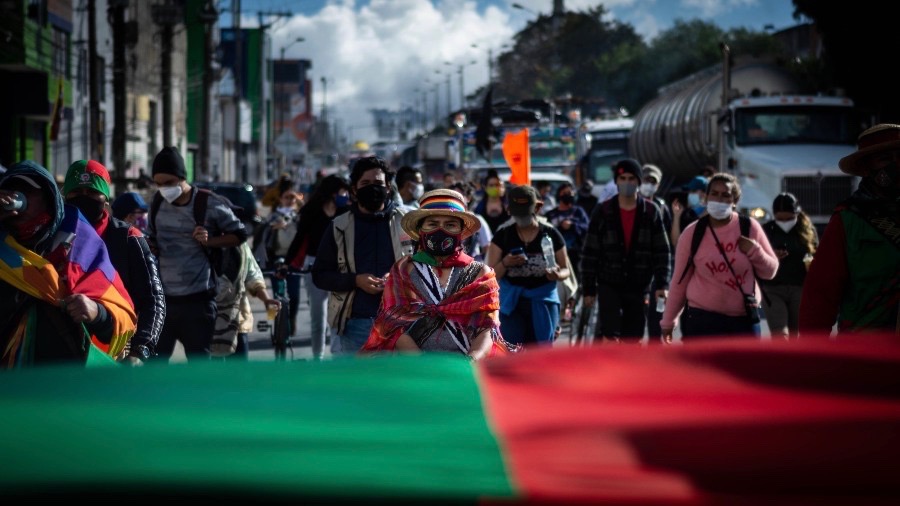On November 24th, La Via Campesina organized a forum to celebrate the 4th anniversary of the signing of the Peace Agreement in Colombia with the objective of sharing reflections on the state of implementation of the Agreement, as well as the challenges facing the peace-building process in the country.
The event was attended by the Common Alternative Revolutionary Force Party – FARC and entities that follow up on the implementation of the Agreement, such as the Food and Agriculture Organization (FAO) of the United Nations, the University of Notre Dame’s Kroc Institute and the Centre for Investigation and Popular Education (CINEP), which is part of the Technical Secretariat of the International Verification component. Likewise, Colombian organizations that are members of the Latin American Coordination of Rural Organizations (CLOC/Colombia) and La Via Campesina commissioners from Asia, Africa, Europe and the Americas participated in this space.
One of the main concerns expressed in the event is the precarious state of progress of the implementation of the Agreement; only 25% of the provisions have been fully implemented. The point that presents the most delay regarding implementation is the Comprehensive Rural Reform (Point 1), which groups 80% of the total commitments, but has only been fully implemented in 4%.
While it is true that the implementation of Point 1 is projected for a period of 15 years, it is highlighted that a number of commitments have not been completed within the established time frame and should already have an impact on the territories. For example, the 16 RRI1 National Plans were due to be completed by 2019; however, only 6 of them have been approved to date. Given the comprehensiveness of the Agreement, the delay in the implementation of some points of the Agreement generates negative cascades in the process; this was particularly evident during Covid-19, as the pandemic could have been better addressed if the RRI National Plans, such as the Rural Health Plan, were being implemented.
The need for a comprehensive understanding of the agreement is emphasized. Although the Territorially Focused Development Programs (PDETs) are being implemented, the objective of structural transformation of the countryside can only be achieved if progress is made on the other sub-points, such as access to land, the constitution or formalization of Peasant Reserve Zones, the approval of RRI National Plans, or compliance with the Program for the Substitution of Illicitly Used Crops, just to mention a few examples.
The delegate of the FARC party, Rodrigo Granda, emphasized that there has been progress in the area of reincorporation, the government has complied partly with the provision of economic support, education and health of the ex-combatants; however, the productive projects that are being carried out in some territories depend on foreign investment, since the State has not been able to comply. But the greatest difficulty faced by people in the process of reincorporation is security: 243 ex-combatants have been killed to date and there have been forced displacements in six different areas of reincorporation.
Granda denounces that the Duque Government is simulating compliance with the Agreement. In national and international instances, the Government publicizes the fulfillment of the Agreement, while it is gradually dismantling it. Likewise, he points out, in relation to the murders, threats, and forced displacements suffered by the former combatants, that the government is on the road to perfidy (…) the opponent, the enemy, cannot be disarmed and then assassinated; this is called perfidy.
The security problems faced by ex-combatants occur in a context of widespread violence in the country: 292 social leaders and human rights defenders have been killed in 2020. Social organizations are denouncing the distress experienced throughout the country due to persecution and harassment. People in the regions are losing confidence to continue with the work of implementing the Agreement, which indicates that the armed groups are fulfilling their objective: to silence the construction of peace.
La Via Campesina’s commissioners emphasize that stable and lasting peace can only be built if there is a comprehensive rural reform, which implies the distribution of property and the promotion of the peasant, family and community economy.
However, in the midst of the failure to comply with the Agreement, Via Campesina’s greatest concern is the onslaught of violence and the increase in crimes and massacres that have been taking place since the signing of the Agreement, without any reaction or response from the State. It appeals to the Colombian state to respond and provide effective security guarantees to social leaders, ex-combatants, and rural populations in general who are suffering from the violence. It also calls on the Colombian State to comply with the commitments it made in Havana.
In the midst of the difficult scenario for peace in Colombia, the Via Campesina commissioners reiterate that the stakes for the fulfillment of the peace agreements in Colombia are decisive, not only for the Colombian people, but also for Latin America and the world’s peasantry.
Cover Photo: March for Dignity, Bogotá/Colombia Informa
1 The National Plans for Comprehensive Rural Reform are aimed at overcoming poverty and inequality in order to achieve the welfare of the rural population; furthermore, they are oriented to closing the gap between the countryside and the city. The Agreement establishes that 16 National Plans should be prepared, focusing on the following areas: i. Infrastructure (tertiary roads, irrigation, electricity, connectivity); ii. Social Development (health and rural education, housing, potable water, labor formalization, social protection, and the right to Food); iii. Stimulus and technical assistance to peasant, family and community-supported agriculture, the solidarity and cooperative economy, and marketing.

